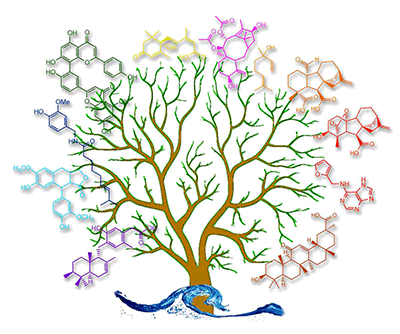Summary
Plants transitioned from aquatic to terrestrial environments approximately 470 million years ago. To survive the harsh conditions on land with a sessile lifestyle, early land plants adopted a unique adaptive strategy: they greatly expanded their metabolic systems. This led to the production of myriad small molecules and biopolymers absent in their aquatic ancestors. These so-called specialized metabolites protect plants against various abiotic stresses and mediate a wide range of interspecies interactions, from defense against pathogens and herbivores to attracting pollinators and symbiont microbes. Additionally, a small subset of plant metabolites evolved as phytohormones, perceived by concurrently evolved signaling networks to regulate plant growth and development in response to environmental cues. Conveniently, humans, as relatively recent arrivals on Earth, also harnessed the chemodiversity of plants for medicinal use, initially through thousands of years of trial and error. Only in the last century have we discovered single plant compounds (e.g., paclitaxel and artemisinin) as essential drugs for treating human illnesses.
Plant metabolism is a treasure trove for multifaceted scientific exploration that can impact plant biology, biochemistry, evolutionary biology, and biomedical research. The extraordinary chemodiversity within the plant kingdom suggests an immense wealth of unknown biochemistry and relevant biological functions waiting to be discovered. Additionally, plant metabolic systems display significant depth and richness in their phylogenetic distribution, offering a unique arena for studying the evolutionary mechanisms and trajectories of complex metabolic traits. Given that numerous plants are renowned for their properties to influence human consciousness and to treat various diseases, leveraging such traditional knowledge through contemporary scientific methods opens up new opportunities to enhance our understanding of human biology and to devise new therapies inspired by natural products.
We are interested in addressing four fundamental questions concerning plant metabolism: (I) How do diverse metabolic traits evolve in plants? (II) How do metabolic systems organize at the subcellular, cellular, tissue, and even interspecies levels to achieve efficient metabolic output in their native plant hosts? (III) What are the biological functions and action mechanisms of discrete plant specialized metabolites in their native plant hosts and/or in the context of treating human diseases? (IV) How can we effectively utilize synthetic biology strategies to engineer the sustainable production of valuable plant-derived natural products?
More detailed description on each of the projects in the Weng lab is listed below:
Multimedia
Uncovering Nature’s riches
The Weng Laboratory integrates the ancient wisdom of traditional plant-based global medicine with genomics, analytical chemistry, and synthetic biology. Our goal is to enhance our understanding of plant metabolic evolution and usher in a new era of natural products-based therapeutics. Click here to experience a multimedia story that explores Jing-Ke Weng’s work.
Decoding the Chemical Language of Nature
A TEDx talk by Jing-Ke Weng in the 2015 TEDx Beacon Street conference.
The Science Behind Traditional Chinese Medicine
A documentary on demystifying Traditional Chinese Medicine (TCM), a 3,000-year-old branch of medicine, through modern scientific approaches.
Produced and directed by Bessie Seiler, LAGP Films.
Solving Biology’s Mysteries with Plants
A short video produced by MITK12Videos highlighting our research on exploring plant metabolism by genetics and metabolomics approaches.
Narrated by Anastassia Bobokalonova
The firefly genome project
Fireflies! These silent fireworks on warm summer nights fill us with wonder. But so much about these fascinating critters remains shrouded in mystery. Our team of biologists has joined forces to sequence the genome of the Big Dipper Firefly, Photinus pyralis. This project is successfully funded through crowdfunding. Please find more information about the project here.
















